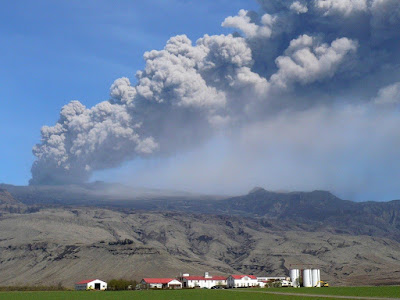When Professor Steve Sparks moved to Bristol from Cambridge in 1989 to take up the Chair of Geology in the School of Earth Sciences little did he know what was in store for him. His time at Bristol would see him advise the government and become one of the most cited scientists of all time.
Sparks’s extraordinary journey as head of the volcanology group has lead it to study volcanism on every continent and has allowed it to grow from one man to a thriving collective of staff, researchers and students. The world-class science produced by the group has resulted in it receiving the Queen’s Anniversary Prize; the highest accolade in higher education.
| Professor Kathy Cashman accepting the Queen’s Anniversary Prize for Higher Education |
Naturally, this evolution has been heavily influenced by volcanoes. Unlike many sciences, the progress of volcanology can be episodic- driven by key eruptions and crises. For the Bristol group, two events have defined their work which has, in turn, altered the course of the science:
The eruption on the Island of Montserrat lasted from 1995 to 1997, killed 23 people and displaced several thousand. As Montserrat is a British dependant territory, the British government was closely engaged in managing the crisis and wasted little time roping in Bristol’s volcanic expertise as Sparks explains: “Bristol was a key partner in establishing the Volcano Observatory on the island and several Bristol staff and PhD students were involved in the monitoring effort in the first few years.” This partnership has continued for the past two decades with Professors Sparks and Aspinall acting as directors of the observatory and heading up the advisory committee ever since. In addition, the research resulting from the eruption has contributed invaluable information to the science of volcanology including causes of volcanic cyclicity and eruptions.
More recently in 2010, the Eyjafjallajokull ash crisis cost the European economy $5 billion through the closure of airspace. In the midst of the decision-making surrounding this closure was a SAGE (Scientific Advisory Group for Emergencies) meeting attended by six volcanologists, of which three were from Bristol. Bristol’s Professor Willy Aspinall, was one of the three called to advise, alongside Dr Matt Watson and Professor Sparks. He described the meeting as a ‘spectrum of people working in many areas from civil aviation to defence’.
 |
| Eruption column above Eyjafjallajokull |
The role Bristol played was pivotal in the national response and was a turning point for the group as a whole as Watson explains ‘Eyja changed how we operated. Volcanology had previously comprised mostly of research produced for other researchers, but this was the first time we could use it practically in a crisis’.
Indeed, not only did it highlight the need for more applied approach to volcanology, it also prompted whole new field of research on volcanic ash involving analysis of ash deposits and advances in remote sensing techniques. Such challenges were met head on by the group that has a huge breadth of research capabilities, from geophysics to geochemistry to petrology.
Looking to the future, the group’s challenge is to be prepared for new eruptions, wherever they may be. The researchers are working in regions all over the world including countries such as Guatemala and Ethiopia. Bristol volcanologists hope to expand this aspect of their research through opportunities such as the Global Challenges Research Fund which will draw together expertise from all corners of the group to address volcanic challenges in less developed nations.
| Keri McNamara looking at a volcanic air fall deposit in Ethiopia, alongside some of the locals |
In recent years, Sparks has stepped down as the head of the group allowing for the appointment of Professor Kathy Cashman as AXA professor of volcanology and the group’s new lead. Now, 27 years after it began, the group is not showing any signs of slowing down. The question is, when will next episode in the group’s history erupt?



